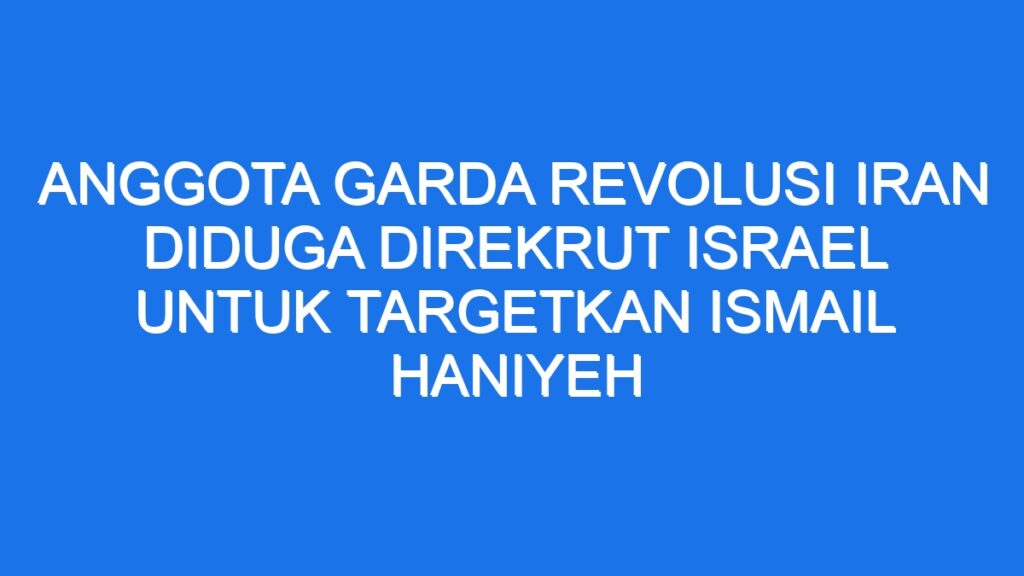Current Events and Tensions: Israel Iran News

The relationship between Israel and Iran remains fraught with tension and complex dynamics. While no formal diplomatic relations exist, recent events have further strained the relationship, highlighting the potential for conflict and the need for careful diplomacy.
Recent Developments and Tensions
The recent escalation of tensions between Israel and Iran is marked by a series of events, including:
- Increased Iranian Drone Activity: Iran has been accused of increasing its drone activity in the region, targeting Israeli and allied forces. The US has condemned these actions, raising concerns about the potential for escalation.
- Israeli Strikes on Iranian Targets: Israel has reportedly carried out airstrikes on Iranian targets in Syria, aiming to disrupt Iran’s military presence in the region. These actions have further heightened tensions and increased the risk of direct confrontation.
- Nuclear Deal Negotiations: Negotiations to revive the Joint Comprehensive Plan of Action (JCPOA), which aimed to limit Iran’s nuclear program, have stalled. The US has expressed frustration with Iran’s lack of cooperation, while Iran has accused the US of imposing unrealistic demands. The stalemate in these negotiations raises concerns about the potential for Iran to pursue nuclear weapons, further exacerbating tensions in the region.
Diplomatic Relations and Statements
Despite the ongoing tensions, there have been some efforts to de-escalate the situation.
- International Efforts: International actors, including the United States and European countries, have called for restraint and dialogue to prevent further escalation. These efforts aim to find a diplomatic solution to the ongoing tensions and prevent a full-blown conflict.
- Statements from Officials: Officials from both countries have made statements that suggest a willingness to engage in dialogue. However, these statements have often been accompanied by strong rhetoric and threats, indicating the fragile nature of the relationship.
Regional Security Implications
The ongoing tensions between Israel and Iran have significant implications for the broader regional security landscape.
- Proxy Conflicts: The conflict between Israel and Iran has often played out through proxy conflicts in countries like Syria and Lebanon. The recent escalation of tensions has raised concerns about the potential for these proxy conflicts to intensify, leading to further instability and violence in the region.
- Arms Race: The ongoing tensions have fueled an arms race in the region, with both Israel and Iran seeking to strengthen their military capabilities. This arms race further increases the risk of conflict and makes it more difficult to find a peaceful solution to the ongoing tensions.
- Regional Alliances: The conflict between Israel and Iran has also led to the formation of regional alliances. Israel has strengthened its ties with countries in the Gulf region, while Iran has sought to build alliances with countries like Syria and Lebanon. These alliances further complicate the regional security landscape and make it more difficult to find a solution to the ongoing tensions.
Nuclear Program and Sanctions

The relationship between Israel and Iran has been fraught with tension for decades, with the Iranian nuclear program serving as a major point of contention. Israel views Iran’s nuclear ambitions as a direct threat to its security, while Iran maintains its nuclear program is for peaceful purposes. The international community has imposed sanctions on Iran in an effort to curb its nuclear program, leading to a complex and evolving situation.
Impact of Sanctions, Israel iran news
Sanctions have had a significant impact on Iran’s economy, hindering its ability to access international markets and finance. This has led to a decline in Iran’s GDP, increased inflation, and a shortage of essential goods. The sanctions have also impacted Iran’s ability to develop its nuclear program by limiting its access to technology and resources.
The impact of sanctions on Iran’s nuclear program is multifaceted. While sanctions have undoubtedly hampered Iran’s progress in certain areas, they have not entirely halted its nuclear ambitions.
Effectiveness of Sanctions
The effectiveness of sanctions in deterring Iran’s nuclear program remains a subject of debate. Some argue that sanctions have been successful in slowing down Iran’s nuclear advancements and forcing it to the negotiating table. Others contend that sanctions have been largely ineffective and have only served to further isolate Iran and exacerbate tensions in the region.
Potential for Future Sanctions
The future of sanctions against Iran is uncertain. While the current administration in the United States has signaled a willingness to engage in diplomacy with Iran, the potential for further sanctions remains a possibility. This will likely depend on the outcome of ongoing negotiations and the perceived progress of Iran’s nuclear program.
Regional Dynamics and Alliances

Israel and Iran are two of the most influential players in the Middle East, with their actions and policies having significant implications for the region’s stability and security. Their respective alliances and interests, often conflicting, shape the complex web of regional power dynamics. Understanding these dynamics is crucial for comprehending the ongoing tensions and potential for conflict or cooperation in the Middle East.
Israel’s Regional Alliances and Interests
Israel’s foreign policy is driven by a combination of security concerns, economic interests, and strategic considerations. Israel has traditionally maintained close ties with the United States, which provides significant military and financial support. It also has strong relationships with several other Western countries, including the United Kingdom, France, and Germany. In the Middle East, Israel has forged strategic alliances with several Arab states, most notably Egypt and Jordan, following the peace treaties signed in 1979 and 1994, respectively. These alliances are based on shared security interests, particularly regarding the threat posed by Iran and its regional allies. Israel also maintains close ties with other countries in the region, such as Saudi Arabia and the United Arab Emirates, although these relationships have become more complex in recent years due to shared concerns about Iran’s nuclear program and regional ambitions.
Israel iran news – The news cycle is a whirlwind these days, with tensions between Israel and Iran escalating rapidly. Amidst this volatile situation, it’s easy to forget about other shocking events, like the recent helicopter crash into a Hilton hotel that left many wondering about the cause and impact.
This incident serves as a stark reminder that the world is full of unpredictable events, and even amidst geopolitical turmoil, life can take unexpected turns.
Israel and Iran have a long and complicated history, marked by political tensions and military posturing. The relationship between the two nations is often characterized by mistrust and a perceived threat from each other. One aspect of this complex dynamic is the history of alleged Iranian attacks on Israeli targets, which has further fueled tensions.
To understand the intricacies of this ongoing conflict, it’s crucial to delve into the history of these alleged attacks, exploring their motivations and consequences. For a comprehensive look at the history of alleged Iranian attacks, check out this insightful article: iran attack.
This information can shed light on the current state of Israel-Iran relations and provide valuable context for understanding the ongoing political and military dynamics between the two nations.
